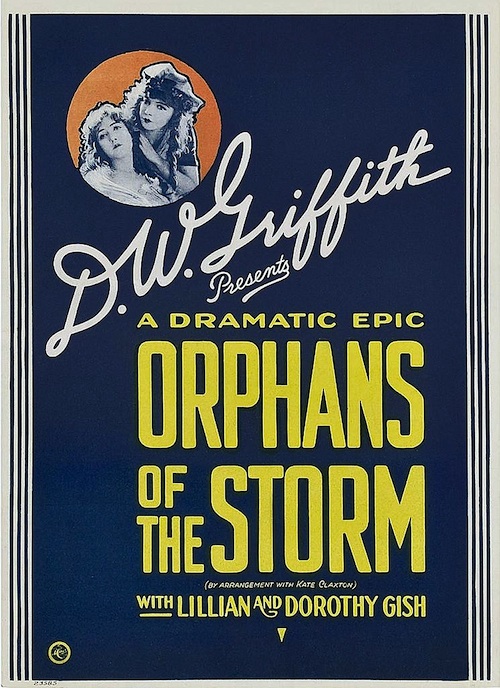
Orphans of the Storm
Orphans of the Storm is a 1921 American silent drama film by D. W. Griffith set in late-18th-century France, before and during the French Revolution.
Orphans of the Storm
D. W. Griffith
Les Deux Orphelines (play)
by Adolphe d'Ennery and Eugène Cormon
D. W. Griffith
- Billy Bitzer
- Hendrik Sartov
- Paul Allen
- Herbert Sutch[1]
- James Smith
- Rose Smith
- Louis F. Gottschalk (original score as performed in cinemas in 1921)
- William P. Perry (Original piano score for 1970s showing on television.)
United Artists (US)
- December 28, 1921 (US)
150 min.
United States
- Silent
- English intertitles
$760,000[2]
The last Griffith film to feature both Lillian and Dorothy Gish, it was a commercial failure compared to his earlier works, such as The Birth of a Nation (1915), Broken Blossoms (1919) and Way Down East (1920).[4]
Griffith used historical events to comment on contemporary events, in this case the French Revolution to warn about the rise of Bolshevism.[5] The film is about class conflict and a plea for inter-class understanding and against destructive hatred. At one point, in front of the Committee of Public Safety, a main character pleads, "Yes I am an aristocrat, but a friend of the people."
The film is based on the 1874 French play Les Deux Orphelines by Adolphe d'Ennery and Eugène Cormon.
Background[edit]
The film is based on the 1874 French play Les Deux Orphelines by Adolphe d'Ennery and Eugène Cormon, which had been adapted for the American stage by N. Hart Jackson and Albert Marshman Palmer[1] as The Two Orphans, premiering at Marshman Palmer's Union Square Theatre (58 E. 14th St.) in New York City in December 1874 with Kate Claxton as Louise.[7] It had been filmed in the United States twice before Griffith did his film: in 1911 by Otis Turner[8] and in 1915 by Herbert Brenon (the lost Theda Bara film The Two Orphans). The play had also been filmed twice in France in 1910: by Albert Capellani[9] and by Georges Monca.[10]
The Two Orphans, the English-language version of the play upon which the movie is based, had been a staple of the actress Kate Claxton. After the premiere at the original Union Square Theatre in 1874, she had performed it hundreds of times for various theatrical companies in New York, including the Brooklyn Theater (she was performing it there on the night of the infamous Brooklyn Theater Fire in 1876), and she had eventually acquired the US rights to the play.
In securing the film rights, Griffith had to wrangle with Claxton, who for unknown reasons seems to have been reluctant to allow the story to be filmed a third time. When Griffith completed his film for release, a rival German version of the story had been made (Claxton owned foreign film rights as well) and was being prepared for release in the US at the same time as Griffith's version. Griffith bought out the US distribution rights to the German version so that it could not conflict with the earning potential of his own film.
Critical reception[edit]
The New York Times wrote: "As the vivid scenes of the historically colored melodrama flashed one after another on the screen everyone surely felt that Griffith was himself again" but added "The seasoned spectator, no matter how he may let himself go, knows that every delay is a device to heighten the suspense and every advantage given the rescuers is calculated to evoke his cheers (...) whatever he does, he is not surprised when the girl is saved".[12]
In a retrospective review, Pauline Kael described it as an epic spectacle, "a marvellous, expensively produced mixture of melodrama and sentimentality, with duels, kidnappings, the storming of the Bastille, and Lillian Gish being saved from the guillotine."[11] She made the assessment that it was "not one of Griffith's greatest", but it nonetheless contains memorable sequences of "theatrical sublimity".[11]
In popular culture[edit]
In Spike Jones' skit "The Late Late Late Movies" (Mercury F-55191), "Billy Playtex" announces that night's feature as "'Orphans of the Storm'", starring the Gish Sisters! And introducing, Elmo Lincoln!" (Actually, Lincoln did not appear in this film.) This is a parody of the fact many stations would air very old movies (even forty-year-old silent pictures), as the movie studios forbade TV from playing first-run features at the time the record was made in 1960.